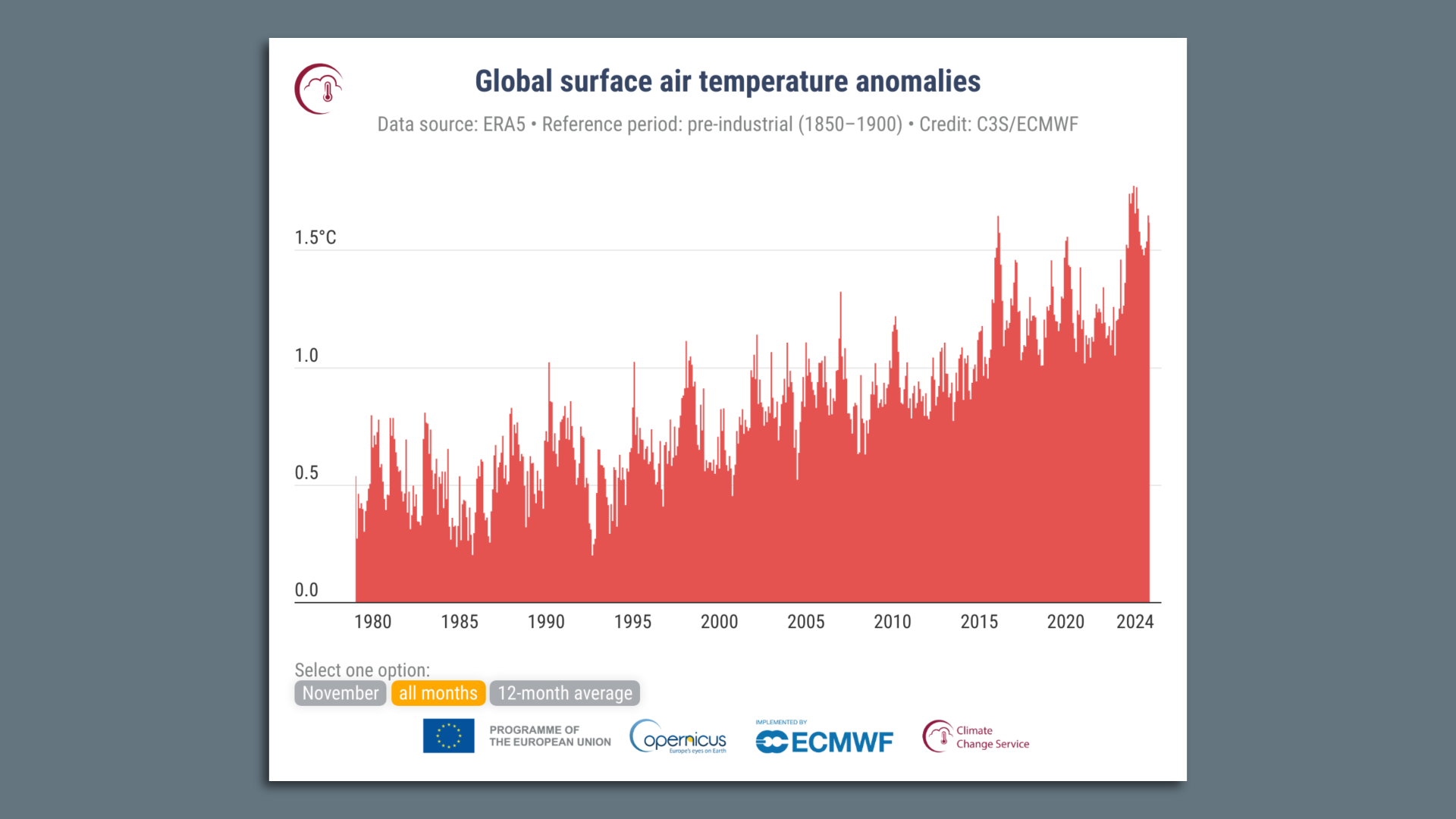
Global surface air temperature departures from average compared to 1850-1900, showing pronounced warming in 2023 and 2024. Image: Copernicus Climate Change Service
The year is closing out with more global temperature records that, in aggregate, largely defy what many climate scientists expected for 2024.
Why it matters: Among the potential factors driving this year's — as well as 2023's — record warmth is the unsettling possibility that global warming is accelerating and the planet's climate behaving differently than expected.
- If so, the climate scenarios that form the basis for countries' decarbonization goals could be faulty, with higher warming levels and greater societal consequences likely to arrive sooner than expected.
Driving the news: New data from NOAA, NASA and the EU's Copernicus Climate Change Service shows that the planet just had its second-warmest November on record.
- These centers use different methods to track global average surface temperatures. They agree that 2024 is on track to be the planet's hottest year in well over a century of instrument record-keeping — and likely at least 125,000 years when including tree rings and ice core data.
- Copernicus, in fact, is out front in saying that 2024 may end up close to 1.6°C (2.88°F) above the pre-industrial average, exceeding the Paris Agreement's most ambitious target for a single year.
- The 1850-1900 average is used as a baseline to approximate the period before the addition of greenhouse gases from burning fossil fuels such as coal, oil and gas.
By the numbers: According to the new Copernicus data, November was the 16th out of the past 17 months during which global average surface temperatures exceeded the 1.5°C target relative to pre-industrial temperatures.
- Separately, NOAA found that so far this year, six continents have had their warmest temperatures on record for the year so far, while Asia has ranked second-warmest.
- During November, a record 10.6% of the world's surface had a record high monthly average temperature, beating the previous milestone set in 2023, NOAA found.
- In addition, the ratio of warm temperature records to cold temperature records set globally during the month was about 50-to-1. That was roughly equal to November 2023 and an increasingly common occurrence in recent years, but largely unheard of prior to about 2010.
The intrigue: At the American Geophysical Union conference in Washington last week, top climate researchers discussed how to account for the steep, as yet incompletely explained warming spike seen during 2023 and 2024.
- They dissected studies that investigated suspects such as changes in low-level cloudiness, a pollution reduction measure that altered the amount of sulfur in marine shipping fuels and a strong El Niño event to try to explain temperature trends.
Between the lines: At the end of a Dec. 10 session on the causes of the 2023 and 2024 warming spike, NASA climate scientist Gavin Schmidt asked for a show of hands from those attending the year's largest climate science conference.
- Only a smattering went up when Schmidt asked them to agree with the statement: "We have understood the anomalies in '23 and '24 with all of the information that has been presented here and that exists elsewhere."
- Instead, the overwhelming majority backed the position that a sufficient explanation hasn't been offered and more research is needed.
- "There is something to explain and there is still work to do," Schmidt said.
The bottom line: While there's virtually zero uncertainty that 2024 will be the hottest on record, plenty of unnerving debate exists regarding how and why this happened — and what it means for the near future.
No comments:
Post a Comment